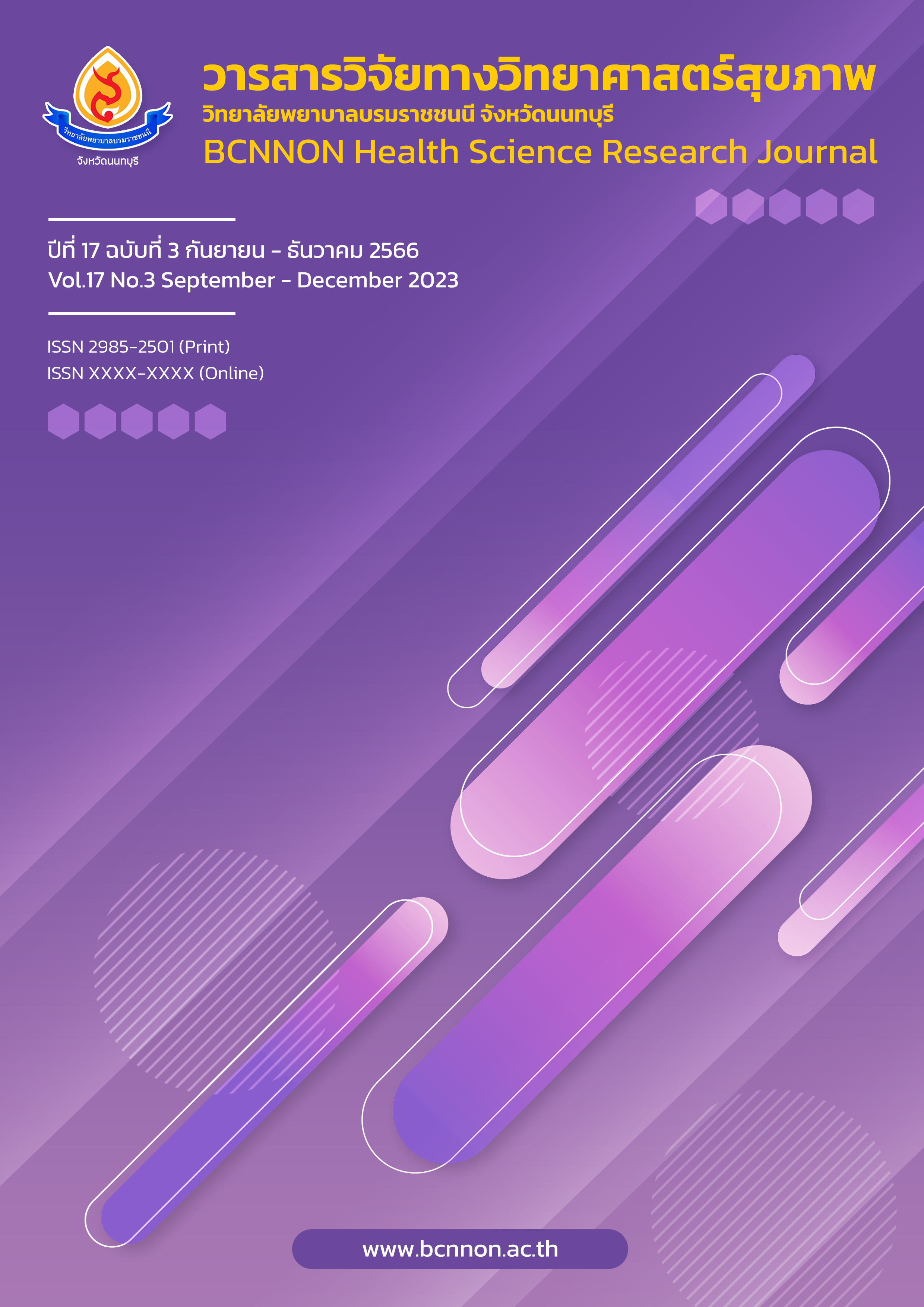ผลของโปรแกรมส่งเสริมความรอบรู้ด้านสุขภาพต่อพฤติกรรมสุขภาพ 3อ.2ส. ของผู้สูงอายุ
Main Article Content
บทคัดย่อ
บทนำ : ความรอบรู้ด้านสุขภาพเป็นปัจจัยสำคัญที่ส่งเสริมพฤติกรรมสุขภาพ โดยเฉพาะอย่างยิ่งพฤติกรรม 3อ.2ส. ในผู้สูงอายุ
วัตถุประสงค์การวิจัย : เพื่อศึกษาผลของโปรแกรมส่งเสริมความรอบรู้ด้านสุขภาพต่อพฤติกรรมสุขภาพ 3อ.2ส. ของผู้สูงอายุ
วิธีการวิจัย : รูปแบบการวิจัยเป็นการศึกษาแบบกึ่งทดลอง ตัวอย่าง คือ ผู้สูงอายุที่มีอายุตั้งแต่ 60 ปีขึ้น แบ่งเป็น 2 กลุ่ม ๆ ละ 64 คน เครื่องมือที่ใช้ในการวิจัย คือโปรแกรมส่งเสริมความรอบรู้ด้านสุขภาพประกอบด้วย กิจกรรมสร้างทักษะ การสื่อสาร การใช้ข้อมูล และการจัดการตนเอง ใช้ระยะเวลาดำเนินการ 12 สัปดาห์ เก็บรวบรวมข้อมูลด้วยแบบสอบถามความรอบรู้ด้านสุขภาพ 3อ.2ส. ที่ให้ตัวอย่างตอบเอง วิเคราะห์ข้อมูลด้วยสถิติเชิงพรรณนาและสถิติการทดสอบที
ผลการวิจัย : พบว่าคะแนนความรอบรู้ด้านสุขภาพและพฤติกรรมสุขภาพ 3อ.2ส. ของผู้สูงอายุหลังเข้าร่วมโปรแกรมส่งเสริมความรอบรู้ด้านสุขภาพและพฤติกรรมสุขภาพ 3อ.2ส. ของผู้สูงอายุสูงกว่าก่อนได้รับโปรแกรมอย่างมีนัยสำคัญทางสถิติที่ระดับ .01 คะแนนความรอบรู้ด้านสุขภาพและพฤติกรรมสุขภาพ 3อ.2ส. ของผู้สูงอายุของกลุ่มที่ได้รับโปรแกรมฯสูงกว่ากลุ่มที่ได้รับความรู้แบบปกติอย่างมีนัยสำคัญทางสถิติที่ระดับ .01
สรุป : โปรแกรมส่งเสริมความรอบรู้ด้านสุขภาพมีประสิทธิผลในการส่งเสริมความรอบรู้ด้านสุขภาพและพฤติกรรมสุขภาพ 3อ.2ส. ในผู้สูงอายุ
Downloads
Article Details

อนุญาตภายใต้เงื่อนไข Creative Commons Attribution-NonCommercial-NoDerivatives 4.0 International License.
บทความที่ได้รับการตีพิมพ์เป็นลิขสิทธิ์ของวิทยาลัยพยาบาลบรมราชชนนี จังหวัดนนทบุรี
ข้อความที่ปรากฏในบทความแต่ละเรื่องในวารสารวิชาการเล่มนี้เป็นความคิดเห็นส่วนตัวของผู้เขียนแต่ละท่านไม่เกี่ยวข้องกับวิทยาลัยพยาบาลบรมราชชนนี จังหวัดนนทบุรี และคณาจารย์ท่านอื่น ในวิทยาลัยฯ แต่อย่างใด ความรับผิดชอบองค์ประกอบทั้งหมดของบทความแต่ละเรื่องเป็นของผู้เขียนแต่ละท่าน หากมีความผิดพลาดใด ๆ ผู้เขียนแต่ละท่านจะรับผิดชอบบทความของตนเองแต่ผู้เดียว
เอกสารอ้างอิง
Foundation of Thai Gerontology Research and Development Institute. (2018). Situation of the Thai elderly 2018. [Internet]. 2019 [cited 2021 Dec 19]; Available from: https://thaitgri.org/?p= 38670. (in Thai).
Division of None Communicable Disease, Department of Disease Control, Ministry of Public Health. Number and mortality rate of five none communicable disease (2019-2021). [Internet]. 2016 [cited 2022 Dec 27]; Available from:http:// www.thaincd.com/2016/ mission/documents-detail.php?id= 14480&tid=32&gid=1-020. (in Thai).
Phimphanchiyaboon L, Sridet R. Enhancement of health literacy among the elderly according to the ASEAN community cooperation for the establishment of the ASEAN Centre for Active Ageing and Innovation: ACAI. Journal of Nursing, Siam University. 2021;22(42):107-14. (in Thai).
Department of Health Service Support, Ministry of Public Health. Behavioral modification by the principle of 3E2S. [Internet]. 2017 [cited 2022 Dec 27]; Available from: http://live.siammedia.org/ index.php/article/chit-chat-health/21163. (in Thai).
Meebunmak Y, Intana J, Kijnopakieat K, Khamthana P, Rungnoei N. Health literacy among older adults in a semi-urban community in Ratchaburi Province. The Southern College Network Journal of Nursing and Public Health. 2019;6 Special;129-41. (in Thai).
Singhasem P, Krinara P, Toparat W. Correlation between health literacy and health behaviors in older people: a survey research in a community, Trang Province. Boromarajonani College of Nursing, Uttaradit Journal. 2019;11(1):37-51. (in Thai).
Maneepong P, Singjuy W, Sookham S, Sriputphong P. The relationship between health literacy and health behaviors 3E-2S in people, Suphanburi Province. The Journal of Boromarajonani College of Nursing Suphanburi. 2021;4(1):84-93. (in Thai).
Thummakul D, Pumtha-it T. Relationship between health literacy and health behaviors of the elderly in Bang Phlat District, Bangkok. Journal of Health Science Research. 2021;15(1):106-18. (in Thai).
Rochanavipat K, Nota W, Panya C. Health literate community model for health behavioral changes in diabetic and hypertensive patients in Wiang Sa District, Nan Province. Journal of Preventive Medicine Association of Thailand. 2020;10(2):274-90. (in Thai).
Phuchongchai T, Nualsithong N, Sukbua K. The effect of health literacy development program among the elderly in Naphai Sub-District, Mueang Chaiyaphum District, Chaiyaphum Province. Journal of MCU Ubon Review. 2022;7(2):1669-76. (in Thai).
Nutbeam D. Health literacy as a public health goal: a challenge for contemporary health education and communication strategies into the 21st century. Health Promot Int. 2000;15(3):259-67. doi: 10.1093/heapro/ 15.3.259.
Arahang R, Hoontrakul S, Roojanavech S. The effects of health literacy enhancement program on hypertensive prevention behavior of pre-hypertension risk group at a community in Nakhon Pathom Province. Royal Thai Navy Medical Journal. 2017;45(3):509-26. (in Thai).
Health Education Division, Department of Health Service Support, Ministry of Public Health. Assessment of health literacy and health behaviors according to principle 3E2S, aged more than 15 years: revised edition 2018. [Internet]. 2018 [cited 2021 Dec 19]; Available from: https://www.nkp-hospital.go.th/th/ H.ed/mFile/20180627124613.pdf. (in Thai).
Wongnisanatakul K. Health literacy among diabetic patients at the Family Practice Center of Phra Nakhon Si Ayutthaya Hospital. Journal of Preventive Medicine Association of Thailand. 2018;8(1):49-61. (in Thai).
Ruangkiatkul N. Factors associated with health literacy among Thai older adults. Journal of Department of Medicine Services. 2022;47(1):80-6. (in Thai).
Sarakshetrin A, Chantra R, Kwanshom R, Ruangdoung L. The effects of using health behavior changing program (food, exercise, emotion, smoking, and alcohol cessation) among village health volunteers at Klongchanak, Muang District, Suratthani Province. The Southern College Network Journal of Nursing and Public Health. 2017;4(1):253-64.
Patzelt C, Heim S, Deitermann B, Theile G, Krauth C, Hummers-Pradier E, et al. Reaching the elderly: understanding of health and preventive experiences for a tailored approach-results of a qualitive study. BMC Geriatr. 2016;16(1):210. doi: 10.1186/s12877-016-0374-3.


